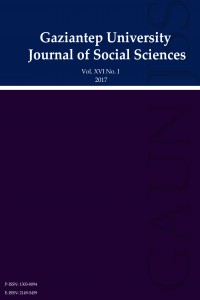Anticipating the Existentialist Hero in Mikhail Lermontov’s A Hero of Our Time and Joseph Conrad’s Nostromo
Öz
Tracing the similarities
and differences between fictional characters belonging to different literary
periods may provide good insight into how a character type may evolve through
time in line with changing conditions and perspectives. This paper engages in
such an activity and attempts to explore the traces of the existentialist and
absurdist hero as set out by figures like Jean-Paul Sartre and Albert Camus in two
earlier examples of Western literature. The paper first looks at Mikhail
Lermontov’s A Hero of Our Time
(1840), analyzing the major character, Pechorin as a “superfluous man” – a
distinctive character type widely encountered in nineteenth-century Russian
literature. It then focuses on Joseph Conrad’s Nostromo (1903) and looks into how the two major characters, Nostromo
and Decoud, include traces of the superfluous man on the one hand and look
ahead to the existentialist hero on the other. In doing all this the paper
suggests that the superfluous man has evolved in time into the existentialist
and absurdist hero and that the characters in Lermontov’s A Hero of Our Time and Conrad’s Nostromo
clearly anticipate this development.
Anahtar Kelimeler
Superfluous Man Existentialist Hero Absurdist Hero Lermontov Conrad
Kaynakça
- Acheraїou, A. (2004). “Action is consolatory”: The dialectics of action and thought in Nostromo. In A. H. Simmons & J. H. Stape (Eds.), Nostromo: Centennial essays (pp. 49-58). Amsterdam: Rodopi.
- Bala, S. (1990). Joseph Conrad’s fiction: A study in existential humanism. New Delhi: Intellectual Publishing House.
- Bohlmann, O. (1991). Conrad’s existentialism. London: Macmillan.
- Camus, A. (1955). The myth of Sisyphus and other essays. New York: Vintage.
- Conrad, J. (1977). Nostromo: A tale of the seaboard. Middlesex: Penguin Books.
- Cornwell, Neil. (1995). Introduction. In M. Lermontov, A hero of our time (pp. xiii-xx). London: Everyman.
- Cox, C. B. (1977). Conrad. Essex: Longman Group Limited.
- Cuddon, J. A. (1991). The Penguin dictionary of literary terms and literary theory (3rd ed.). London: Penguin Books
- Foote, Paul. (1987). Introduction. In M. Lermontov, A hero of our time. Middlesex: Penguin Books.
- Goldman, A. H. (2013). Philosophy and the novel. Oxford: Oxford University Press.
- Lermontov, M. (1995). A hero of our time. London: Everyman.
- Mathewson, R. W. Jr. (2000). The positive hero in Russian literature. Evanston: Northwestern University Press.
- Sartre, J. (2003). Existentialism is a humanism. In M. Calarco & P. Atterton (Eds.), The continental ethics reader (pp. 87-94). New York: Routledge.
- Spittles, B. (1990). How to study a Joseph Conrad novel. Houndmills: Macmillan.
- Wachtel, A. (1998). Psychology and society. In M. V. Jones & R. F. Miller (Eds.), The Cambridge companion to the classic Russian novel (pp. 130-149). Cambridge: Cambridge University Press.
- Watts, C. (1993). A preface to Conrad. London: Longman
Mikhail Lermontov’un Zamanımızın Bir Kahramanı ve Joseph Conrad’in Nostromo’sunda Varoluşçu Kahramanın Haberciler
Öz
Farklı edebi dönemlere ait roman karakterleri arasındaki benzerlik ve farklılıkları incelemek, herhangi bir karakter tipinin zamanın değişen şartları ve fikirleri içerisinde nasıl evrildiğini görmeye de olanak sağlar. Bu çalışmada böyle bir amaç güdülmekte ve Jean-Paul Sartre ve Albert Camus gibi düşünürlerin çizdiği varoluşçu ve absürd karakter tiplemesinin izleri önceki edebi örneklerde aranmaktadır. Çalışmada öncelikle Mikhail Lermontov’un Zamanımızın Bir Kahramanı (1840) üzerinde durulmakta ve buradaki “lüzumsuz adam” tiplemesi, başkarakter Pechorin üzerinden incelenmektedir. Sonrasında ise Joseph Conrad’in Nostromo (1903) romanı irdelenmekte ve buradaki Nostromo ve Decoud isimli iki ana karakterin bir yandan “lüzumsuz adam” izleri barındırdığı, diğer yandan da varoluşçu kahramanın habercisi olarak ortaya çıktığı vurgulanmaktadır. Tüm bunları yaparken bu çalışmada, “Lüzumsuz Adam”ın zaman içerisinde varoluşçu ve absürd karaktere evrildiği ve de Lermontov’un Zamanımızın Bir Kahramanı ile Conrad’in Nostromo’sunda çizilen başkarakterlerin bu değişim ve gelişimin habercisi olduğu öne sürülmektedir.
Anahtar Kelimeler
Kaynakça
- Acheraїou, A. (2004). “Action is consolatory”: The dialectics of action and thought in Nostromo. In A. H. Simmons & J. H. Stape (Eds.), Nostromo: Centennial essays (pp. 49-58). Amsterdam: Rodopi.
- Bala, S. (1990). Joseph Conrad’s fiction: A study in existential humanism. New Delhi: Intellectual Publishing House.
- Bohlmann, O. (1991). Conrad’s existentialism. London: Macmillan.
- Camus, A. (1955). The myth of Sisyphus and other essays. New York: Vintage.
- Conrad, J. (1977). Nostromo: A tale of the seaboard. Middlesex: Penguin Books.
- Cornwell, Neil. (1995). Introduction. In M. Lermontov, A hero of our time (pp. xiii-xx). London: Everyman.
- Cox, C. B. (1977). Conrad. Essex: Longman Group Limited.
- Cuddon, J. A. (1991). The Penguin dictionary of literary terms and literary theory (3rd ed.). London: Penguin Books
- Foote, Paul. (1987). Introduction. In M. Lermontov, A hero of our time. Middlesex: Penguin Books.
- Goldman, A. H. (2013). Philosophy and the novel. Oxford: Oxford University Press.
- Lermontov, M. (1995). A hero of our time. London: Everyman.
- Mathewson, R. W. Jr. (2000). The positive hero in Russian literature. Evanston: Northwestern University Press.
- Sartre, J. (2003). Existentialism is a humanism. In M. Calarco & P. Atterton (Eds.), The continental ethics reader (pp. 87-94). New York: Routledge.
- Spittles, B. (1990). How to study a Joseph Conrad novel. Houndmills: Macmillan.
- Wachtel, A. (1998). Psychology and society. In M. V. Jones & R. F. Miller (Eds.), The Cambridge companion to the classic Russian novel (pp. 130-149). Cambridge: Cambridge University Press.
- Watts, C. (1993). A preface to Conrad. London: Longman
Ayrıntılar
| Konular | Sanat ve Edebiyat |
|---|---|
| Bölüm | İngiliz Dili ve Edebiyatı |
| Yazarlar | |
| Yayımlanma Tarihi | 31 Ocak 2017 |
| Gönderilme Tarihi | 25 Ekim 2016 |
| Yayımlandığı Sayı | Yıl 2017 Cilt: 16 Sayı: 1 |


